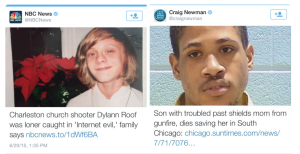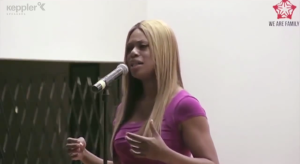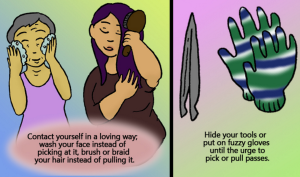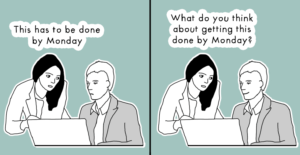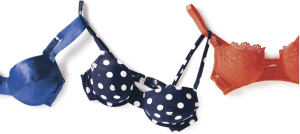
Source: Clutch
When Amy arrived at college, she hardly identified as a feminist.
Growing up in a conservative environment, she was familiar with the “man-hating” connotations feminism held and stayed far away from them.
No one identified as a feminist in her family or group of friends, and so it was strange when she started to become fascinated with understanding oppression, especially as it related to gender inequalities.
While strong women surrounded Amy in her life, she felt the roles that many of them existed in were limiting. She longed for a language that recognized these limitations.
Feminism offered this.
She began to pore over the writings of bell hooks and Gloria Steinem, watch Laci Green videos, and read Feministing blogs. Finally, Amy decided that she was, indeed, a feminist.
For anyone that experiences this transformational time, it is an extremely liberating feeling.
But in college, and especially at a somewhat conservative college, how could she find outlets for expressing her feminism?
Conversely, when Erin arrived at college, she was already a full-fledged feminist activist.
She was working for Everyday Feminism as an Online Community Manager, writing for several online publications, running her own blogs, and was involved in a lot of non-profit work.
Similar to Amy, no one really identified as a feminist in Erin’s family or group of friends growing up, but she eventually found it while she was in high school, figuring out who she was.
She was a voracious reader (and still is!) and had just happened to pick up Jessica Valenti’s Full Frontal Feminism at the bookstore with some of her birthday money out of curiosity.
She fell in love with the book, and it gave her a lot of new ideas to chew on, things she had never even thought twice about.
She started reading every feminist book that she could get her hands on and learned as much as she could.
Then she started blogging, and the rest – as they say – is herstory.
Despite their journeys to finding feminism being somewhat similar, Amy and Erin now find themselves in an interesting situation: They are both in college – one conservative and one liberal – and they see the need for some advice on how to be a collegiate feminist activist, regardless of your environment.
This article is it.
Make the Opportunities and Get Involved
Amy
If I’ve learned anything throughout my four years in college, it is that opportunities do not always come to you. You must go to them.
Most often, this takes courage.
As a first-year student, I remember asking a close friend if I should join a feminist club on campus. His response was, “Amy, don’t do that. People won’t like you as much if you start getting all radical.”
His response discouraged me.
Would people really find me unattractive and crazy if I joined a group that works to promote equality? Doesn’t that say enough?
It took me a year to work up the courage to ask about a feminist student group and quickly found that such a thing didn’t exist.
I was saddened and shocked.
I knew so many people on campus suffering from eating disorders, gender and sexual identity issues, and unhealthy relationships. How could a student group not be educating and working to resolve these issues?
While counseling centers and other resources existed to support these students, there was not a student-run group that allowed for solidarity.
It took me all of about one second to decide that I needed to start one.
Word spread fast, and quickly, three other passionate students jumped on board.
We created Gender Equality Allies, a one of a kind student feminist organization.
We decided to focus on the three primary issues (body image, sexual violence, and gender stereotypes) for most events, while also drawing upon other important issues as we saw fit.
We’ve hosted film screenings about the nature of masculinity, provided free dessert tables, and even created a 15-foot graffiti wall on which students were encouraged to write positive body messages!
Our event audiences fluctuate from a small five attendees to fifty attendees, depending. But most importantly, we are able to be a group that finally says to so many, “You are not alone.”
Erin
I’ve only been at my college for a few months, but I can definitely say that there are a lot of opportunities for feminist activism here on my campus.
I go to a fairly liberal university, where we house both a Women’s and LGBT center, but after attending a community college for two years during high school that was in a suburban, fairly conservative area, I really appreciate everything that my university has to offer.
A friend of mine and I tried to start a feminist group on that campus and weren’t allowed to. We were told we would be promoting favoritism to women by promoting equality and empowerment – go figure.
On my current campus, though, we also have an advocacy program for sexual assault, at least three feminist organizations, and even online campaigns, including the viral We’re a Culture, Not a Costume.
There definitely aren’t many gaps to fill here. For me, it was just a matter of choosing what I was going to get involved in.
College Culture
Amy
As a feminist and a college student, college culture can be extremely discouraging.
Since I go to a school that has a strong Greek system, I not only felt encouraged to join these organizations as a first-year student, but also to uphold everything they have to offer even when I didn’t join them.
When I attended the Greek system information session during my first year, the “recruitment fashion show” disheartened me when it explained how I must dress at each event. Never a fan of authority or gender stereotypes, I ditched the dress and ended up not going.
Along with the complexities of social circles in college lies the social hierarchy, which is far more frustrating and exists inside and outside of Greek life.
I cannot count on my fingers and toes how many times I’ve heard people make remarks about a woman they hardly know saying, “Can you believe she’s wearing that at a party like this?”
People quickly judge other students for personal behavior, dress, and can end up contributing to rape culture when they do so.
I once heard from a sorority friend that they had blacklisted one woman from recruitment because she “slept around too much” and would “damage their sorority’s image.”
I was appalled.
You can imagine that the icing on the crap cake was when I was invited to a “CE0 and Sluts” party the next week.
All of this feels like a lot to tackle, especially when you’re dealing with your own insecurities in college.
The biggest advice I can offer is to speak up.
This can mean a variety of different things.
I’ve written or commented for pieces in the school paper or various student blogs and have hosted discussion groups that highlight particular issues.
Use college for what’s it’s for: learning and growing.
Take your stand, and always be willing to learn, too.
Erin
I go to a school that is fairly infamous for being a “party school,” so there are a lot of problems here with alcohol and consent.
A few months ago, there was a sexual assault in front of a bank close to campus that made national news.
The reactions – unsurprisingly – were mostly of the victim-blaming variety, and it created a lot of controversy.
The president of our student senate also sent out a slut-shaming tweet towards the beginning of the semester, which also caused an outcry.
As frustrating as it is to see the patriarchy routinely upheld, I’m also encouraged by all of the people speaking out against these incidents.
College is what you make it.
As such, I choose to abstain from partying. It’s just not something that I find fun, and it doesn’t fit into how I want to live my life (not that there’s anything wrong with wanting to party, if that’s your thing).
So while I’m aware of the party culture here on campus, it’s not something I have a whole lot of experience with.
Remember: Only you get to decide how you want your college experience to look. And if you don’t want to succumb to the cultural pressures on campus, you don’t have to.
Keep the Faith
Amy
I have been continually pegged as the “feminist” on my campus.
I’m not the only one by any means, and I’m grateful for the men and women who advocate for equality on my campus.
Perhaps it’s my vocalization that singles me out, but for as many times as I’ve received eye rolls in class for pointing out sexism or received negative Facebook or Twitter comments after speaking up against misogyny, I’ve also received apologies from young men who admit to misogyny, as well as positive messages from students and teachers thanking me for taking a stand.
It’s true that your activism will not be without obstacles.
But lean on your friends and self-care and always keep the faith.
This will mean different things for different people.
For me, it means taking a long nap, eating some melted chocolate chips, or enjoying a quick (many times solo) dance party. Allow yourself to take the breaks you need.
Erin
There is definitely still backlash to feminism on my college campus.
Just recently, I was at an open-mic night at a local coffee shop, which featured some artists who were using some very misogynistic lyrics.
I wrote to the manager of the coffee shop and told him that this made me uncomfortable, since I wasn’t comfortable saying something as it was happening.
They responded and assured me that it wouldn’t happen again and that they would be in contact with the responsible parties!
You can definitely speak up in ways that make you feel safe and comfortable and still make a difference.
Even if you get discouraged, realize that there are probably other people who have the same thoughts as you do and might want to speak up, but are afraid.
Be the voice of change.
The Importance of Feminist Activism in College
Amy
Feminist activism has been central to my college career, but it’s also important on every campus.
College is a time for growth and change.
Experiencing change can feel isolating, but feminism allows you to give voice to your oppression while also providing a supportive community.
At times, my college can feel overwhelmingly conservative and difficult to navigate with a progressive viewpoint.
My feminist activism has given me a network that does not discount my views, but celebrates them.
Thankfully, this is something you don’t have to work too hard for. If you’re doing the activism, people will similar ideologies will want to be a part of it. This may not come quickly, but it will come.
And if your campus is extremely conservative and you feel like the only one, the online feminist community is ready and waiting to be your friend!
Erin
Feminism has been a very important part of my life for the last year and a half.
I was lucky enough to have gotten involved in online feminism before I went off to college, so finding my niche here wasn’t difficult.
There are so many amazing groups here that are already doing so much to make a difference.
And Amy is right: College is a time for growth. So try something new.
Go to a rally, join a feminist club on campus, or start one yourself.
Be fearless.
You really will get out of feminist activism what you put into it, so my advice is to go all in. And don’t let anything (or anyone) get in your way.
Want to discuss this further? Login to our online forum and start a post! If you’re not already registered as a forum user, please register first here.
Amy is a senior at Wake Forest University studying Communication and Women’s and Gender Studies & Sexuality. She co-founded Gender Equality Allies, a student organization that aims to educate and raise awareness to gender issues such as body image, sexual misconduct, and stereotypes. Recently, Amy traveled to Paris to research the concept of beauty. Post-grad, she hopes to work for a feminist organization to fight injustice and spread the message of self-love. She also enjoys chocolate, traveling, and Shania Twain, always. Find her on Twitter @AnthemofAmy and Tumblr.
Erin McKelle is a Contributing Writer and Online Community Manager for Everyday Feminism. She’s an e-activist, video blogger, student, and non-profit advocate and has launched several projects including Fearless Feminism and Consent is Sexy. In her spare time, Erin enjoys reading, writing bad poetry, drawing, politics and reality TV. You can find her blogging at Fearless Feminism, Facts About Feminism, and Period Positive. Follow her on Twitter @ErinMckelle and read her articles here.
Search our 3000+ articles!
Read our articles about:
Our online racial justice training
Used by hundreds of universities, non-profits, and businesses.
Click to learn more







